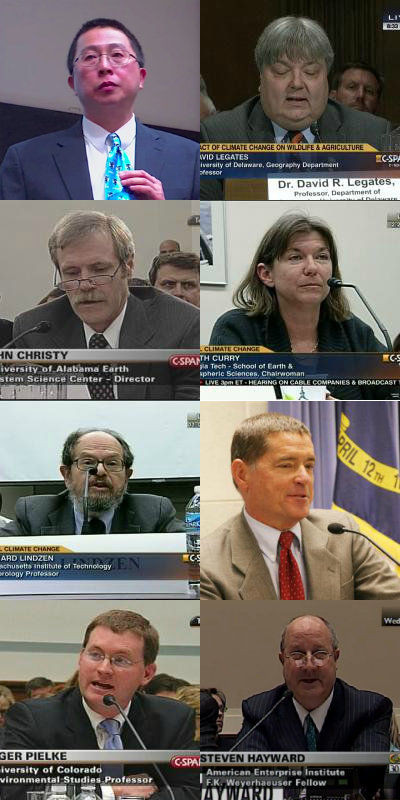
Climate-disinformation academics (clockwise from top left): Willie Soon,
David Legates, Judith Curry, Robert Balling, Steven Hayward, Roger
Pielke Jr, Richard Lindzen, John Christy
The conflict-of-interest scandal involving a climate denier secretly funded by the fossil-fuel industry is spreading to other academics who oppose regulation of climate pollution. A top House Democrat has issued letters asking several researchers who have appeared as Republican witnesses before Congress questioning climate science to disclose their funding sources.
Over the weekend, multiple news organizations reported on the undisclosed funding of Harvard-Smithsonian’s Dr. Willie Soon by Koch Industries, Exxon Mobil, Southern Company, and other greenhouse polluters. “There are just so many things that we do not know about how the climate really works and what are the factors that cause it to change,” Soon testified before the U.S. Senate in 2003, “to really jump to the conclusion that it will all be CO2.”
Rep. Raul Grijalva (D-Ariz.), the ranking member of the House Committee on Natural Resources, is asking the universities of seven academics, some of whom are climate scientists, others social scientists, who are part of a small stable of repeat Republican witnesses on climate science and policy.
Soon and the targets of this investigation have appeared at least three dozen times before Congress over the past twenty-five years to question the scientific need to limit greenhouse pollution.
“I am hopeful that disclosure of a few key pieces of information will establish the impartiality of climate research and policy recommendations published in your institution’s name and assist me and my colleagues in making better law,” Grijalva wrote. “Companies with a direct financial interest in climate and air quality standards are funding environmental research that influences state and federal regulations and shapes public understanding of climate science. These conflicts should be clear to stakeholders, including policymakers who use scientific information to make decisions. My colleagues and I cannot perform our duties if research or testimony provided to us is influenced by undisclosed financial relationships.”
The letters request the institutions’ disclosure policies, drafts and communications relating to Congressional testimony, and sources of external funding for the academics in question.
The disclosure requests are needed because Congressional “truth in testimony” rules require witnesses to disclose government funding sources, but not private or corporate funding. Under Republican control, the rules are unevenly implemented, with not-for-profit witnesses required to submit pages of additional disclosures, while corporate-sector witnesses are not.
The seven academics who dispute the scientific consensus on anthropogenic global warming who have been asked to disclose their funding are (dates of Congressional testimony in parentheses):
- David Legates, Department of Agricultural Economics & Statistics, University of Delaware climatologist (6/3/14, 7/29/03, 3/13/02)
- John Christy, University of Alabama atmospheric scientist (12/11/13, 9/20/12, 8/1/12, 3/31/11, 3/8/11, 2/25/09, 7/27/06 (video), 7/20/06, 5/13/03, 5/2/01, 5/17/00, 7/10/97)
- Judith Curry, Georgia Institute of Technology climatologist (1/16/14, 4/25/13, 11/17/10, 4/26/07, 7/20/06)
- Richard Lindzen, Massachusetts Institute of Technology atmospheric physicist (11/17/10, 5/2/01, 7/10/97, 1991 (Senate), 10/8/91)
- Robert C Balling Jr, Arizona State University geographer (3/6/96; North Carolina Legislature 3/20/06)
- Roger Pielke Jr, University of Colorado political scientist (12/11/13, 7/18/13, 7/20/06, 5/16/07, 1/30/07 (video), 7/20/06, 3/13/02)
- Steven Hayward, School of Public Policy, Pepperdine University historian (5/25/11, 10/7/09, 4/22/09, 3/12/09, 3/17/99)
Update: Further appearances by Curry, Pielke Jr, and Christy in 2006 and 2007 have been added (h/t Dr. Curry).